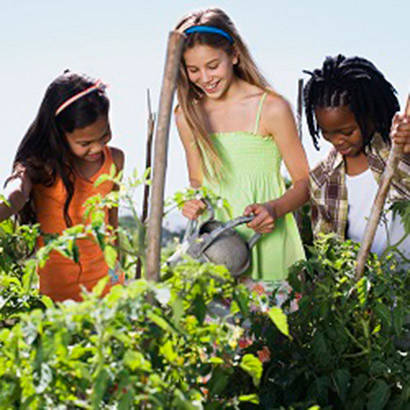
Hunter Park, a 13-acre park on the east side of Lansing, is located in an economically and racially diverse neighborhood. About two-thirds of the population is white, 15% African- American, and about 12% Latino. One in 10 residents are foreign-born, with many from Cuba, Afghanistan, Somalia, and elsewhere in Africa. The neighborhood has about two dozen neighborhood associations. The park is under the jurisdiction of the City of Lansing Parks and Recreation Department. The Allen Neighborhood Center (ANC), a nonprofit organization, administers the programming that takes place there.
Joan Nelson, ANC Director, described Hunter Park a number of years ago when it was rarely used by residents and was a meeting place for gangs and prostitutes. In the summer of 2004, ANC in partnership with the Parks and Recreation Department began work on a master plan for the park. Neighborhood residents identified a number of desired park improvements, including construction of a large greenhouse. From the beginning, a portion of the greenhouse was designated for youth to plant an urban fruit and vegetable garden. The partnership between ANC, the Parks and Recreation department, and the large number of community residents, who were involved in the planning and implementation process, was successful in revitalizing the park. Hunter Park is now the hub of the community. The revitalization of the park was accompanied by improvements in the surrounding neighborhoods, including reduced crime. Ms. Nelson stated, “We see park improvement as a neighborhood stabilization strategy. …The connection between improving a park and improving the neighborhood surrounding it is pretty important to us.”
The revitalization of Hunter Park set the stage for the development of the youth gardening program which began in the greenhouse and spread to a large area of the park.
ANC hosts the Youth Service Corps, in which middle- and high-school youth undertake service projects in the community. The NRPA grant is being used to support the Youth Service Corps’ gardening projects. When the greenhouse opened in May 2008, the Youth Service Corps built raised beds. There are currently 24 raised beds that are used year-round. The teens also established a large bed outdoors. They sell their produce at ANC’s weekly farmers’ market, which is close to the park, and also bring some home for their families. About two years ago, the teens began a project called Garden in a Box, in which they build 2' by 2' cedar boxes and deliver them to people in the neighborhood with limited mobility, income, or gardening skills, to enable them to grow their own vegetables. This year, they are creating what they have called an Edible Hunter Park. Given the high level of food insecurity in the neighborhood, the youth decided to fill the park with produce that will be available to anyone for the picking. As Ms. Nelson described, their goal was that, “Anybody could eat their way through the park.” Working with two landscape design students from nearby Michigan State University, they planted an apple orchard, “living fences’’ of grape vines and berry bushes, and an edible ornamental garden along one wall of the greenhouse. A MSU student is making signage for the Edible Park. Although the number of teens involved in the youth corps has declined recently, ANC is considering strategies to increase participation.
A weekday program for children in the 5-to-11 age group, Kids Time, uses another garden that was built for that program. Forty-six children are enrolled, and on any given day, there are at least 15 in attendance. Their garden work enables them to provide their own snacks, and there is also a nutrition education component. In addition, they participate in ANC’s Market Walk program. Every time they accumulate 10 miles of walking, they get a $5 coin to spend at the farmers’ market.
ANC children’s and youth gardening programs involve a number of partners that help to leverage resources, and in doing so, help to provide financial sustainability. The Department of Parks and Recreation is an ongoing partner. United Way (ANC is a United Way agency) recruited MSU students to help prepare the bed for the edible ornamental garden. ANC also has interns from MSU and the local community college, and they are applying for an AmeriCorps grant to provide a full-time staff person for their children’s programs. They will continue to rely on volunteers and currently have about 200 who contribute over 9,000 hours a year.
ANC recently became part of a collaborative of nonprofit community development organizations in Lansing that have park-based gardening projects. Called Let’s Garden Lansing, the collaborative organizes gardening-related workshops, classes, and events. A focus of the collaborative is youth gardening, and monthly workshops for teachers are planned for this year to promote school-based gardening.
